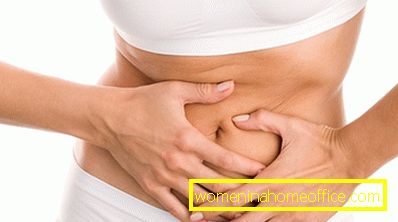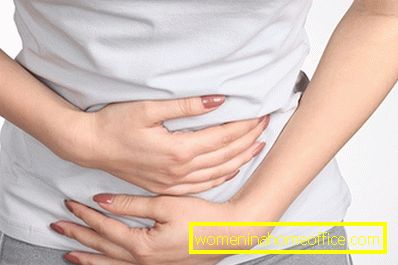Colic in the stomach in adults
The pain can never be ignored, especially if it occurs in the stomach. Are you familiar with this condition - a sharp pain of a spastic character that lasts for several hours? It can cause colic in the stomach. In adults, they are quite common. How to remove pain, than to treat an acute abdomen? Find out now so that the pain does not take you by surprise!
What is intestinal colic?

Today, few people can boast that they eat natural products, live in an ecologically clean area and are not familiar with stress. Such costs of civilization turn into intestinal problems. Sometimes they are manifested by severe spastic pain - an attack of colic occurs.
Intestinal dyskinesia, or colic, is not a separate disease: it is a manifestation of a disease. It is characterized by:
- peristalsis disorder;
- violation of tone;
- spasm.
Colic in the abdomen in adults sometimes lasts for several hours or a couple of minutes. Often the pain is localized in the same place. The attack can be so strong that a person even loses consciousness.
Colic in the abdomen in adults: organic and functional causes

What can cause colic? Consider the causes of its occurrence:
- gastrointestinal tract diseases - gastritis, ulcers, cholecystitis;
- a menu of foods that cause fermentation in the intestines - sauerkraut, kvass, flour products made from yeast dough, pickled apples. Excessive passion for smoked meats, spicy, fatty and fried foods;
- wrong diet - overeating, eating a dry meal, fasting;
- poisoning with spoiled, insufficiently heat-treated foods, drugs or mushrooms;
- infection by pathogenic microorganisms - salmonella, the causative agent of dysentery;
- depression, nerve overload;
- lead poisoning;
- in women, colic may be associated with gynecological diseases, ectopic pregnancy, impending menstruation;
- helminthiasis;
- viral infection. With influenza or ARVI, the virus sometimes gets to the intestines and causes inflammation of the lymph nodes located in the abdominal cavity;
- intestinal obstruction caused by a violation of its motility, untimely emptying (in which the feces accumulate), stretching the intestinal loops. Such a problem arises in the formation of adhesions and tumors.
Symptoms that help diagnose

Intestinal colic declares itself quite eloquent signals, so it is unlikely to be confused with something else. It may be:
- sharp pain with cramps. It quickly increases and makes people literally bend in half. In women, it gives to the appendages, in men, to the testicles;
- bloating, constipation, belching, pain when touching the stomach;
- nausea and vomiting;
- upset stomach, the presence of mucus in the feces;
- general weakness (against the background of normal temperature), loss of appetite;
- the symptom of "lead" colic is a grayish rim between the teeth and gums;
- if colic is associated with viral infection, then it is accompanied by a cough, runny nose.
The patient becomes pale, sedentary and indifferent, covered with cold sweat.
What diagnostics is done to determine the cause?

Diagnosis will begin with examination and palpation of the abdomen. The doctor will determine the location of the pain and assess the tension of the peritoneum. He will refer the patient to a blood test (clinical and biochemical) and urine. The feces will also be examined for hidden blood. To establish whether undigested food remains in the intestines, a coprogram is conducted.
For accurate diagnosis using ultrasound of the kidneys, gall, liver. To check if there are any lesions, tumors and other structures in the intestine, it is examined with an endoscope. A complete picture of the state of the intestines will give colonoscopy and fluoroscopy using contrast agents. Computed tomography helps to diagnose.
Treatment of intestinal colic in the hospital and at home

How to alleviate the suffering of colic in the stomach in adults? What to do to relieve pain and spasm? You can give No-shpu, Smektu, Platyfillin. Applying a heating pad, do an enema, and give analgesics is extremely dangerous, because you can not exclude an attack of appendicitis.
If this has already happened and a functional disorder has been diagnosed, then you can drink 1-2 tablets of Bécarbon, Besalol, Bellalgin.
The patient should be provided with peace, for 12 hours he should not eat food (you can satisfy your hunger with warm tea with a rusk).
The strategy of medical treatment depends on the diagnosis. If it is established that colic is associated with intestinal obstruction, neoplasms, urolithiasis, then the problem will be solved by surgical methods.
If helminths are found, then anti-parasitic therapy is carried out. When the culprit is an intestinal infection, antibiotics (Levomitsetin, Gentamicin) and antiseptics (Biseptol or Furozalidone) are prescribed.

If the patient's condition is extremely serious, then put droppers with glucose, saline, blood plasma and vitamins.
To relieve the pain caused by colic in the abdomen in adults, the drugs are injected. Do an injection of Dimedrol, Papaverin and Atropine, use antispasmodics Drotaverin, Notenzil, Bekarbon.
Folk remedies are suitable for fighting colic:
- decoction of chamomile and immortelle;
- to remove the parasites, you can drink an infusion of 2 tbsp. l pumpkin seeds, 2 tsp. sugar, boiled in 300 g of water;
- good to drink every day on an empty stomach 2 tbsp. carrot juice mixed with spinach;
- To improve the bowels should use tea from fennel, mint, sage, wormwood and yarrow;
- from the colic help dried watermelon peels. They are poured with boiling water (for 1 l of water - 100 g of crusts), insist, filter and drink three times a day.
Adults suffer from colic most often due to improper lifestyle: low physical activity, destructive habits, passion for fast food and food stuffed with "chemistry". Often enough to eliminate these factors, and health will return to normal. But colic is an alarming symptom, so it is better to find out its cause using medical diagnostics.